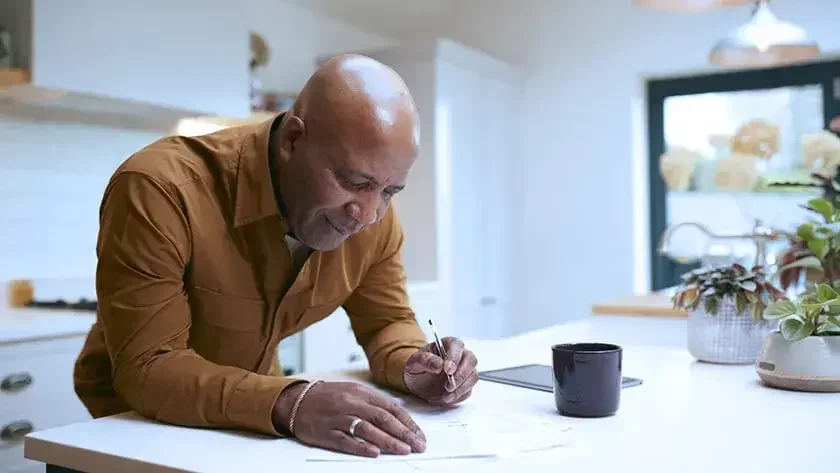Only 45% of U.S. adults have created estate planning documents. Without even a simple will or living trust, much of your legacy is left up to the courts. This can keep your loved ones from inheriting the property you want to leave to them.
For those who haven't created any estate planning documents, 60% report not making any effort to start. Understandably, estate planning can be an uncomfortable topic to think about and even harder to talk about, but it is something you shouldn't postpone for too long.

Here are 38 estate planning statistics for a closer look at how common estate planning is among various demographics, why so many people don't have a will, the effects of major world events on estate planning, and tips for making a will.
General estate planning statistics
56% of Americans believe that estate planning is important, but only 45% of adults in the U.S. have documented their end-of-life plans. Here are some other recent estate planning statistics from surveys of Americans.
- 24% of Americans have a will. (Caring.com)
- American retirees expect to transfer more than $124 trillion to their families, friends, nonprofits, and additional beneficiaries by 2048. (Merrill Lynch)
- 23% of people update their wills after getting married or having a child. (Caring.com)
- 52% of people don't know where their parents store estate planning documents. (Cambridge Trust)
- Nearly 25% of people say nothing would motivate them to create an estate plan, while 11% report that the death of a loved one would motivate them to prioritize estate planning. (Caring.com)
- 18% of people don't know what an advance healthcare directive is. (Cambridge Trust)
- Only 46% of will executors were aware of a will. (SeniorLiving.org)
- 30% of people update their wills because they bought a home or property, got a raise at work, or inherited money from a loved one. (Caring.com)
- 43% of Americans report not having a will or other estate planning documents because they simply haven’t gotten around to it. (Caring.com)
56% of Americans feel they don’t have enough assets to justify creating an estate plan, or stress that creating one is low on their priority list. (Caring.com)
We’ll help guide you through your estate plan—whether you need a will or trust.

Estate planning statistics by demographic
Estate planning initiatives vary widely by age, race, and socioeconomic status.
Estate planning statistics by age
It's best practice to begin planning your estate in your 20s and 30s, and no later than your 40s. Younger people may feel that they have all the time in the world, they have nothing of value to leave behind, or that the cost of estate planning is too high, but there are solutions for everyone. And if you have minor children, starting soon after their birth can be beneficial. This gives you a chance to appoint a guardian for any minor children you have.
Looking at these statistics, it’s easy to see why starting a will earlier is a good idea.
- 24% of 18- to 34-year-olds have a will. (Caring.com)
- 25% of 25- to 54-year-olds have a will. (Caring.com)
- 43% of people over the age of 55 have a will. (Caring.com)
- 81% of people over the age of 72 have a will. (AARP)
Estate planning statistics by race
Due in part to wealth gaps, wage inequalities, and a lack of access to financial literacy education, fewer Black individuals, Indigenous individuals, and people of color (BIPOC) invest in estate planning, a crucial step in accruing generational wealth. Statistically, BIPOC individuals are less likely to have an estate plan or to have discussed estate planning with their loved ones.
- The number of Black Americans who have a will has increased by 8% since 2023. (Caring.com)
- Black Americans have surpassed Hispanic Americans in estate planning since 2021. (Caring.com)
- 34% of white adults have a will. (Caring.com)
- 31% of Black adults have a will. (Caring.com)
- 22% of Hispanic adults have a will. (Caring.com)
Estate planning by socioeconomic status
Wealthy and educated Americans often have the most physical and digital assets to leave to their families, but regularly postpone the estate planning process due to busy schedules and high stress.
- 63% of people who make more than $80,000 per year cite not having “gotten around to it" or procrastinating as their primary reason for putting off estate planning. (Caring.com)
- 2% of people who earn between $40,000 and $80,000 annually say they don't have time to write a will, while 32% believe they don't have enough assets to leave behind. (Caring.com)
20% of people who earn less than $40,000 per year say that they don't have enough assets to leave, while 11% believe estate planning is too expensive. (Caring.com)

Inheritance planning statistics
While the average inheritance people leave to their loved ones is $46,200, that amount can vary heavily based on the benefactor's retirement savings, debts, education, and financial literacy throughout life.
- The median inheritance among white families is $88,500. (Annuity)
- The median inheritance among Black families is $85,000. (Annuity)
- The median inheritance among Hispanic families is $52,000. (Annuity)
- Nearly 70% of property owners plan to bequeath real estate to their heirs. (Bloomberg)
- Parents with a college degree bequeath an average of $92,700 to their families. (The Federal Reserve)
- Parents without a college degree leave behind an inheritance of $76,000 on average. (The Federal Reserve)
- 43% of people expecting an inheritance expect to receive property like a house or land. (New York Life)
Estate planning procrastination statistics
Some people delay estate planning because they believe certain myths about wills—for example, that they are confusing or expensive. Others believe that they don't have enough assets to warrant writing a will.
- 43% of American adults say they don't have a will because they haven't gotten around to it. (Caring.com)
- Roughly 35% of American adults say they don't have a will because they don't have enough assets to leave to someone. (Caring.com)
- 11% of American adults say they don't have a will because they believe it's too expensive to write one. (Caring.com)
12% of American adults say they don't have a will because they don't know how to write one. (Caring.com)
Our step-by-step online tool helps you make key decisions with confidence, at your pace.

Other estate planning statistics
Choose a person you trust and start discussing advance health care directives, end-of-life plans, and important asset management details. This is a crucial part of estate planning and guarantees that you and your loved ones aren't sidelined later in life.
- Probate expenses can cost between 3% and 7% of an estate’s value. (LegalZoom)
- Probating a will can take anywhere from a few months to several years. (LegalZoom)
- 34% of people started estate planning due to the birth of a child. (PlannedGiving.com)
- 43% of people said a health concern or medical diagnosis would motivate them to write a will, while others said purchasing a home or retiring would cause them to start estate planning. (Caring.com)
- For most people, estate planning starts with talking to a loved one. 20% of people choose to talk with a loved one about estate planning, while 10% start by doing some solo research online. (Caring.com)
What happens if you die without a will?
Dying without a will—also called dying intestate—means that state law ultimately dictates who receives your assets. When this happens, the court has to rely on the law to determine who receives what. This means your final wishes may not be honored, and someone you don’t want to leave assets to could end up inheriting your property. The best way to prevent putting the court in charge of your estate is to create a will and update it regularly.
To prevent that scenario, you should write a will and update it regularly.
When should you write a will?
It’s never too soon to create a will. However, many agree that it’s best to make at least a simple will as soon as you become a legal adult.
Your will can be as simple or as detailed as you want it to be, and you can always include other estate planning documents to fully protect your interests and help you leave a lasting legacy for those you love. For many, this includes documents such as the following.
- Financial power of attorney. Appoints an agent to handle your finances for you if you are unable to handle them yourself.
- Living will. Your living will informs your family members about your wishes for end-of-life healthcare decisions.
Living trust. Much like a last will and testament, this legal document allows you to dictate who should receive your assets upon your death. The primary difference between a will and a living trust is that your assets can be transferred to your beneficiaries without going through the probate court process.

How LegalZoom can help you with your estate plan
When you're gone, your legacy will live on. A will and other estate planning documents ensure that you'll still be able to care for the people and causes that matter most to you for years. Planning early can help you leave behind assets and resources that impact the world and your loved ones and family members for generations to come.
LegalZoom can help you create a will that explains your wishes and ensures that your loved ones receive the assets you want to leave to them. If you want to help your loved ones avoid probate, LegalZoom can also help you create a living trust.
Estate planning FAQs
How are survivorship life insurance policies helpful in estate planning?
Unlike an individual life insurance policy, where the beneficiary receives their payout on the death of the policyholder, you can also choose to invest in a “second to die" policy. This is more commonly known as a survivorship policy. This policy distributes funds to beneficiaries after the second policyholder dies. Generally, a couple's children are the recipients. This tool is used to help reduce estate taxes
Remember, you can change beneficiary designations at any time if your circumstances or preferences change.
What documents do you need to create an estate plan?
It's a good idea to consult an attorney to ensure you have all the documents you need to plan your estate. These documents can help you get started:
- Real estate deeds
- Vehicle titles
- Investment certificates
- Financial information
- Retirement plan details
- Unpaid debts
- Information about final arrangements or funeral payment plans
Our platform helps you create or update your plan—step-by-step, with attorney support when you need it.

How much does estate planning cost?
Estate planning with an attorney can vary, but it typically costs between $1,200-$4,000.
If you're one of the thousands of people who are worried about spending that kind of money on an estate plan, consider using a self-guided service with attorney assistance to save some money, or get a basic last will for $99. This plan includes:
- Last will & testament
- Financial power of attorney
- Healthcare directive
- HIPAA authorization
- 30 days of free revision
- Printing and shipping of one set of documents
LegalZoom also provides a premium will estate plan, which includes attorney guidance and unlimited revisions for $249 for one person and $349 for two people.
What is the role of an executor in estate planning?
The executor of the will is a trusted person whom you designate to carry out the instructions documented.
What does an estate planning attorney do?
An estate planning attorney can help you create a plan to help plan for incapacity and ensure that your assets go where you want them to once you're gone.
Also called estate lawyers and probate attorneys, these licensed professionals will help you navigate both state and federal estate laws. They can also handle the legal paperwork that allows you to care for your chosen beneficiaries for years to come while reducing the overall tax burden on them.


